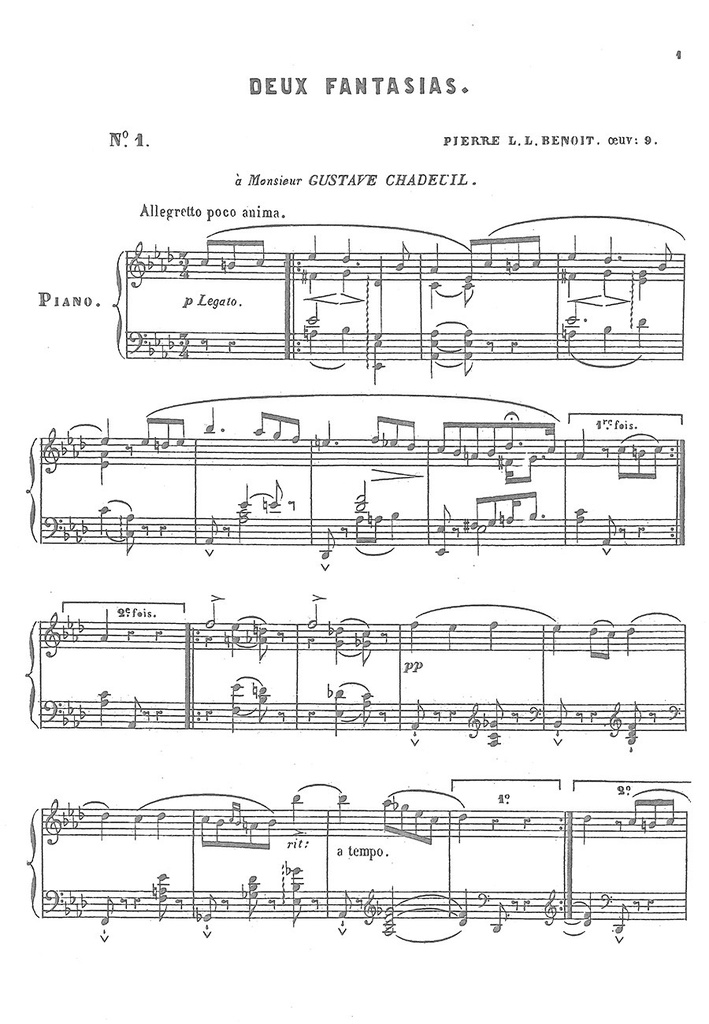4 Fantaisies
Description
Peter Benoit
(Harelbeke, 17 August 1834 – Antwerp, 8 March 1901)
4 Fantaisies
(1860)
Peter Benoit composed the major part of his piano music when he stayed in Paris as laureate of the Belgian Prix de Rome around 1860. In addition to a batch of minor piano works he then also wrote his only piano sonata and the cycle Contes et ballades (published in this series as number 565). Several of those piano compositions were also published in Paris: due to the enormous popularity of the piano there was a great and unrelenting demand for new piano music. To illustrate the instrument’s popularity: on 27 June 1861 the Brussels periodical Le Guide musical reported that Paris counted 20,000 piano teachers, and on 5 December 1861 the same magazine wrote that some people were considering the levying of taxes on pianos.
The 4 fantasias that Benoit composed in all likelihood in 1860 were published in three separate volumes by the Paris music publisher Richault: Deux fantasias op. 9, Troisième fantaisie op. 18 and Quatrième fantasia op. 20. Most probably the fantasias were published early in 1861: on 16 December 1861 the periodical La France musicale informs that Benoit had delivered several pieces for piano to the publishing house of Richault, and on 21 February 1861 he mentions in a letter to his parents that he intends to send them some recently published piano pieces.
With a view to drawing attention to his compositions despite the fact that the Parisian market was daily inundated with piano pieces it was strategically productive to dedicate them to piano teachers, pianists and music reviewers. Benoit dedicated opus 9 to Gustave Chadeuil, music critic with the newspaper Le Siècle; opus 18 to the pianist Angèle Tailhardat and opus 20 to the pianist Rosa Escudier-Kastner, spouse of the music publisher and music critic Marie Escudier (to whom he had already dedicated earlier his Trois caprices op. 7).
No doubt Benoit knew Angèle Tailhardat through his friend, ‘doctor’ Paul Gachet (famous by virtue of Van Gogh’s painting), who was in turn on friendly terms with the brother of the young pianist, himself also a doctor.
On 21 March 1861 Angèle Tailhardat’s recital at the Herz Hall included in addition to works by Beethoven, Chopin and Gottschalk also Benoit’s Deux fantasias op. 9. In Le Guide musical of 4 April 1861 the following review appeared (based on French critiques), in one stride throwing light on part of Benoit’s Parisian piano music:
“We dwell with pleasure on the concert given at the Salle Herz on 21 March by Miss Tailhardat. The young pianist had made a felicitous choice of pieces: a trio by Beethoven, works by Chopin, Pierre Benoît and Gottschalk. – What a pleasure to find a pianist who doesn’t play her own music! – Miss Tailhardat’s performance is sensible; she interprets the composers with an excellent musical flair. The work by Mr Benoit entitled Deux Fantasia had a great impact. Mr Benoît is a composer of the good school: his compositions for piano have nothing in common with the gymnastics of the fingers in which often resides the only merit of such modern conceptions. The Caprice in F minor, the Fantasias and the mazurkas, opus 8, are works that recommend themselves both by virtue of their original turn of ideas and of their elegance. In Inquiétude, a romance without words, one finds the whole importance and the distinction of Mendelssohn’s romances without words. A glance at the Trois Caprices, opus 7, and at the Fantaisies, opus 18 and 20, suffices to convince us that the author, to be sure while writing remarkable works specifically for the piano, has an overriding loyalty to musicality. No thoughts artificially intertwined, resulting only in an epileptic walk of the fingers on the keyboard. No, this was not in the least Mr Pierre Benoît’s intention when he offered the fruit of his studies to the public. He proves his mettle as a composer while others remain mere pianists. We are delighted to do this talented man justice after Germany has already recognized him as such before us.”
Of the four fantasias the third one is by far the most popular one: the piece was adapted several times and it is by a large margin the most frequently played Flemish piano piece. This Troisième Fantaisie has been recorded on CD by Ronald Brautigam (‘Van Liszt en zo meer’, Eigenwijs EW9416), Jozef De Beenhouwer (‘In Flanders’ fields’,vol.15, Phaedra 92015) and Peter Vanhove (‘Flemish Romantic and Impressionist Piano music’, Pavane ADW 7463). A recording from 1977 by Marie-Claude Werchowska was re-issued in 1998 on CD (‘Belgian Works for Piano’, René Gailly 99009). All fantasias have been recorded by Frédéric Gevers and are available on the CD ‘Music from Flanders, vol. 1: Peter Benoit’ (DOM 291034).
Jan Dewilde (translation Joris Duytschaever)
Reprint of a copy from the library of the Royal Flemish Conservatory in Antwerp. This score was published in cooperation with the Centre for Flemish Music (Studiecentrum voor Vlaamse Muziek(www.svm).
- Winkel Antwerpen : Available
